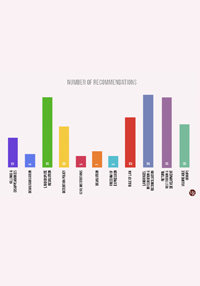The Civil Society Organization Sustainability Index (CSOSI) has been used since 1997 to assess the sustainability of the CSO sector. The Index has expanded considerably since its inception – it went from covering 18 countries in the Europe and Eurasia Region, to covering over 60 countries in different regions around the world. By using standard indicators and collecting data each year, the CSOSI enables users to track developments and identify trends in the CSO sector over time while allowing for cross-country and cross-region comparison. It is used by CSO advocates, development partners, and academics to assess international and regional trends in the civil society sector and to identify common obstacles impeding the sector’s sustainability, such as the legal environment, organizational capacity, and financial viability. This is the second time Sri Lanka is participating in the index. Verité Research is the local implementing partner for this initiative.
Over the years, the nature and extent of civil society space has been determined by the policies and ideologies dominant in the political sphere. Accordingly, transitions of power have been accompanied by radical transformations of civil society space. In this context, a critical question arises: is it possible for CSOs advancing liberal and democratic ends to maintain their space notwithstanding political transitions? Verité’s recent study sought to identify the driving factors that determine the sustainability of democratic space within which CSOs operate in Sri Lanka, and present a strategic view on how this space can be sustainably maintained and expanded in the future, notwithstanding political transitions.
This brief analyses some of the changes made to the original 19th Amendment Bill during deliberations at the Committee State in Parliament. It also assesses the final version of the Amendment in terms of its delivery on the people’s expectations with respect to democratising and depoliticising governance.
“Can the President’s executive powers be controlled through strengthening the Prime Minister’s functions without a referendum?” – This question has generated much commentary and dominated many discussions after the recent Supreme Court Ruling on the 19th Amendment Bill. This brief seeks to demystify and concisely explain two major principles on which the ruling was framed and explain in terms thereof, their implications for the executive power and office of the President, outlining the type of relevant constitutional changes that requires a referendum and the type that doesn’t.
This report analyses the legal and policy frameworks applicable to domestic workers in Sri Lanka. The report uses global standards of decent work to offer a fresh perspective on the problem and aims to outline a strategy for sustainable reform in Sri Lanka.
Verité Research recently conducted interviews with 22 members of civil society organizations to assess the quantity and quality of research on the subject of domestic workers’ rights in Sri Lanka. While measuring and evaluating current literature on domestic workers, this report sets out a four-pronged hypothesis on why domestic workers’ rights have not featured on the civil society agenda in Sri Lanka.
LLRC Implementation Monitor: Statistical and Analytical Review No. 3 is Verité Research’s latest study on the Lessons Learnt and Reconciliation Commission (LLRC). This report is the outcome of twelve months of monitoring the implementation of the LLRC’s recommendations. The report examines in detail the implementation status of 189 LLRC recommendations. It also provides an initial quantitative analysis of 563 complaints made before the LLRC during its public hearings.






